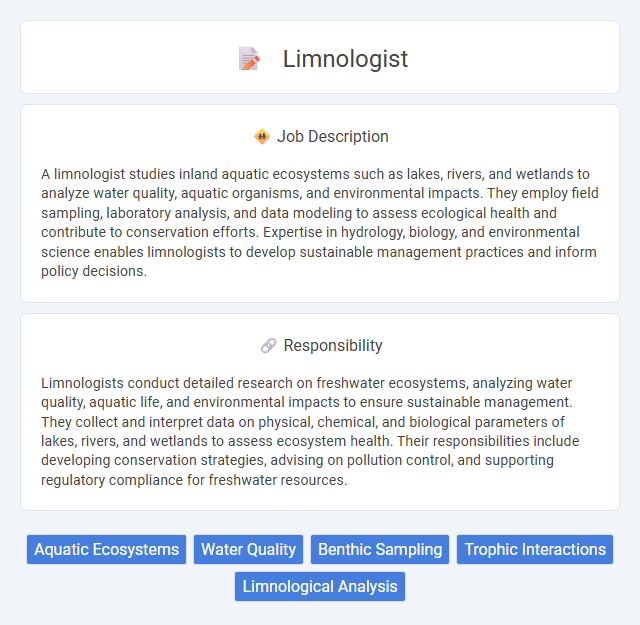
A limnologist studies inland aquatic ecosystems such as lakes, rivers, and wetlands to analyze water quality, aquatic organisms, and environmental impacts. They employ field sampling, laboratory analysis, and data modeling to assess ecological health and contribute to conservation efforts. Expertise in hydrology, biology, and environmental science enables limnologists to develop sustainable management practices and inform policy decisions.
Individuals with strong analytical skills and a passion for aquatic ecosystems are likely well-suited for a career as a limnologists. Those comfortable with fieldwork, data collection, and scientific research may find this job fulfilling. People preferring stable, indoor-only work environments might face challenges adapting to the varied settings typical of limnology.
Qualification
A limnologist typically holds a bachelor's or master's degree in environmental science, biology, ecology, or a related field, with advanced knowledge in freshwater ecosystems. Proficiency in water quality analysis, sampling techniques, and data interpretation is essential, alongside skills in GIS and statistical software. Relevant field experience and certifications in environmental monitoring or aquatic science significantly enhance job qualifications.
Responsibility
Limnologists conduct detailed research on freshwater ecosystems, analyzing water quality, aquatic life, and environmental impacts to ensure sustainable management. They collect and interpret data on physical, chemical, and biological parameters of lakes, rivers, and wetlands to assess ecosystem health. Their responsibilities include developing conservation strategies, advising on pollution control, and supporting regulatory compliance for freshwater resources.
Benefit
Limnologists likely experience significant benefits from their work, such as contributing to freshwater ecosystem conservation and gaining valuable insights into aquatic biodiversity. This career may offer opportunities for fieldwork and research that support environmental sustainability and inform water resource management policies. Job stability and professional growth in environmental science could also be anticipated benefits for those pursuing this path.
Challenge
Limnologists likely encounter complex challenges related to assessing the health of freshwater ecosystems, where variables such as pollution, climate change, and invasive species create unpredictable conditions. They probably need to develop innovative research methods and adapt to rapidly changing environmental data to provide accurate assessments and recommendations. Managing limited resources and balancing ecological preservation with human activity might also present ongoing difficulties in their work.
Career Advancement
Limnologists specializing in freshwater ecosystems can advance their careers by gaining expertise in aquatic environmental management, hydrology, and pollution control. Pursuing advanced degrees such as a master's or Ph.D. in limnology or environmental science enhances opportunities for research leadership, consulting roles, and academic positions. Certifications in water resource management and experience with geographic information systems (GIS) further support career growth in governmental agencies and environmental organizations.
Key Terms
Aquatic Ecosystems
Limnologists specialize in studying freshwater aquatic ecosystems, including lakes, rivers, and wetlands, to understand their physical, chemical, and biological processes. They collect and analyze water samples, monitor biodiversity, and assess the impact of environmental changes on aquatic habitats. Their expertise supports water quality management, conservation efforts, and sustainable resource use.
Water Quality
Limnologists specializing in water quality analyze biological, chemical, and physical characteristics of freshwater bodies to assess pollution levels and ecosystem health. They employ advanced sampling techniques and analytical instruments to monitor contaminants, nutrient cycles, and oxygen distribution in lakes, rivers, and wetlands. Their data supports environmental management policies and sustainable resource use for maintaining aquatic biodiversity and public health.
Benthic Sampling
Limnologists specializing in benthic sampling focus on collecting and analyzing sediments, organisms, and organic material from the bottom layers of lakes, rivers, and wetlands to assess water quality and ecosystem health. They utilize specialized tools like grabs, cores, and dredges to gather benthic macroinvertebrates, sediment composition, and contaminant levels, crucial for environmental monitoring and habitat assessment. Expertise in benthic sampling supports conservation efforts, pollution control, and biodiversity studies in freshwater ecosystems.
Trophic Interactions
Limnologists specializing in trophic interactions analyze the feeding relationships and energy flow within freshwater ecosystems, including lakes, rivers, and wetlands. They study the roles of primary producers, consumers, and decomposers to understand nutrient cycling and ecosystem stability. Their research informs conservation strategies and water resource management by revealing impacts of pollution, invasive species, and climate change on aquatic food webs.
Limnological Analysis
Limnologists specialize in the scientific study and analysis of inland aquatic ecosystems, including lakes, rivers, and wetlands, to assess water quality, biodiversity, and ecological health. Limnological analysis involves collecting and interpreting physical, chemical, and biological data such as nutrient levels, water temperature, dissolved oxygen, and microbial populations. These analyses support environmental monitoring, pollution control, and habitat restoration efforts aimed at preserving freshwater resources.
 kuljobs.com
kuljobs.com